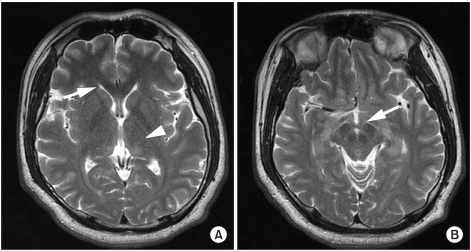Ann Rehabil Med.
2011 Aug;35(4):583-586. 10.5535/arm.2011.35.4.583.
Wernicke's Encephalopathy after Sleeve Gastrectomy for Morbid Obesity: A Case Report
- Affiliations
-
- 1Department of Physical and Rehabilitation Medicine, Soonchunhyang University Hospital, Soonchunhyang University College of Medicine, Seoul 140-743, Korea. spotdoc88@gmail.com
- 2Department of General Surgery, Soonchunhyang University Hospital, Soonchunhyang University College of Medicine, Seoul 140-743, Korea.
- KMID: 1971728
- DOI: http://doi.org/10.5535/arm.2011.35.4.583
Abstract
- Morbid obesity is a curable systemic disease that can cause several complications, including hypertension, diabetes mellitus, and osteoarthritis. However, it is not easy to control solely by conservative management. Bariatric surgeries, such as sleeve gastrectomy and gastric banding, are recently developed treatments that are applied to patients with morbid obesity in Korea. However, gastric surgery can cause surgical or metabolic complications, such as thiamine deficiency, which can lead to Wernicke's encephalopathy. This metabolic complication presents with typical symptoms of confusion, ophthalmoplegia, nystagmus, and ataxia. In this case report, we present a case of Wernicke's encephalopathy, which developed slowly following sleeve gastrectomy in a patient with morbid obesity.
MeSH Terms
Figure
Reference
-
1. Lanthaler M, Aigner F, Kinzl J, Sieb M, Cakar-Beck F, Nehoda H. Long-term results and complications following adjustable gastric banding. Obes Surg. 2010; 20:1078–1085. PMID: 20496124.
Article2. Makarewicz W, Kaska L, Kobiela J, Stefaniak T, Krajewski J, Stankiewicz M, Wujtewicz MA, Lachinski AJ, Sledzinski Z. Wernicke's syndrome after sleeve gastrectomy. Obes Surg. 2007; 17:704–706. PMID: 17658035.
Article3. Rothrock JF, Smith MS. Wernicke's disease complicating surgical therapy for morbid obesity. J Clin Neuroophthalmol. 1981; 1:195–199. PMID: 6213661.4. Sola E, Morillas C, Garzon S, Ferrer JM, Martin J, Hernandez-Mijares A. Rapid onset of Wernicke's encephalopathy following gastric restrictive surgery. Obes Surg. 2003; 13:661–662. PMID: 12935373.
Article5. Arimura K, Murai H, Kikuchi H, Shigeto H, Taniwaki T, Furuya H, Kira J. Relapsing Wernicke's encephalopathy after gastrectomy. Nippon Naika Gakkai Zasshi. 2005; 94:1606–1608. PMID: 16190343.
Article6. Moon JL, Song DH, Kwon J, Chung YC. Wernicke's encephalopathy caused by dysphagia in down syndrome: a case report. J Korean Acad Rehabil Med. 2009; 33:742–745.7. Sechi G, Serra A. Wernicke's encephalopathy: new clinical settings and recent advances in diagnosis and management. Lancet Neurol. 2007; 6:442–455. PMID: 17434099.
Article8. Zuccoli G, Gallucci M, Capellades J, Regnicolo L, Tumiati B, Giadas TC, Bottari W, Mandrioli J, Bertolini M. Wernicke encephalopathy: MR findings at clinical presentation in twenty-six alcoholic and nonalcoholic patients. AJNR Am J Neuroradiol. 2007; 28:1328–1331. PMID: 17698536.
Article9. Singleton CK, Martin PR. Molecular mechanisms of thiamine utilization. Curr Mol Med. 2001; 1:197–207. PMID: 11899071.
- Full Text Links
- Actions
-
Cited
- CITED
-
- Close
- Share
- Similar articles
-
- Simultaneous Laparoscopic Band Removal and Sleeve Gastrectomy: Case Report and Review of Literature
- Case Report: Gastrobronchial Fistula after Sleeve Gastrectomy: Treated by Laparoscopic Proximal Gastrectomy with Double Tract Reconstruction
- A Case of Bilateral Sudden Deafness Caused by Wernicke Encephalopathy
- Two Cases of Wernicke's Encephalopathy with Hyperemesis Gravidarum
- Delayed-onset Wernicke Encephalopathy in a Patient with Gastrectomy


